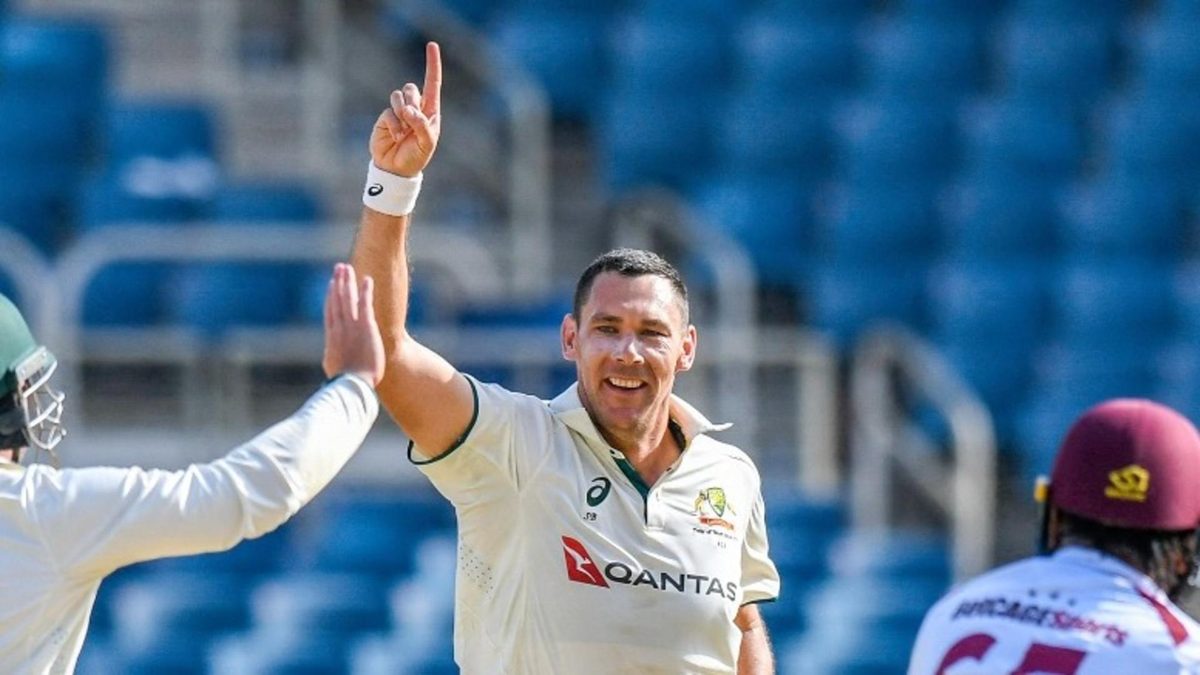
In a game that often worships pace, flair, and fire, Scott Boland offers something altogether different. Call it restraint, call it craft, or simply call it the most underappreciated virtue in modern Test cricket: control. And on July 15 in Kingston, that quiet mastery erupted into something unforgettable—a hat-trick that was as precise as it was poetic.
The West Indies were already teetering. Then Boland arrived with the final incision. Three balls. Three wickets. Justin Greaves, Shamar Joseph, Jomel Warrican. Gone. Clean. Like a tailor pulling three tight stitches to close the fabric of a match—and a series—Boland ended it all with brutal, whispering efficiency.
The scoreboard read 27 all out. The second-lowest team total in Test history. The series? A 2-0 sweep for Australia. The mood in the Boland camp? Characteristically understated.
And yet, the moment was monumental. Only nine other Australians before him had managed a Test hat-trick. Boland, at 36, joined that elite club not with explosive speed, but with the kind of quiet devastation that has become his signature.
The Specialist in Shadows
Scott Boland’s story isn’t one of overnight stardom. It’s one of patience, of waiting behind Mitchell Starc, Josh Hazlewood, and Pat Cummins; of being on every squad list but rarely in the XI. In another country’s lineup, he might have racked up 50 Tests. In Australia, he became a specialist in shadows.
And yet, whenever summoned, he performs like he’s never been away.
“He would have played a lot more Tests in another team,” Starc admitted after Kingston, reflecting what most of the cricketing world now believes. “Every time he comes in, he’s on the money.”
That’s Boland. No rust. No drama. Just relentless accuracy. Metronomic lines. Balls that threaten the edge, whisper past the stumps, draw false strokes. A bowler who doesn’t need time to get into rhythm because he is rhythm.
Captain Pat Cummins put it best: “It was a classic Boland spell—three wickets at or just outside the stumps.” There was admiration in his tone, but also something deeper: a recognition of value that transcends flash.
A Cult Hero with No Cult
Boland’s rise to cult hero status was sudden—six for seven at the MCG in the 2021 Ashes did that. But he never chased the spotlight. Even then, amid the roar of a home crowd and global applause, Boland simply nodded, took the ball, and got back to work.
Kingston was no different. The hat-trick ball? Full, straight, unplayable. The celebration? A smile, a few pats on the back, and the same quiet walk back to the huddle.
No leap. No roar. Just closure.
More Than Just Numbers
In the age of analytics and high-speed highlight reels, Boland is an anomaly. He doesn’t need pace above 140 or a funky wrist position. He thrives on simplicity. Six-metre length. Off-stump line. Repeat. And then, when you least expect it, he strikes.
Boland’s bowling is steeped in cricketing intelligence. He reads conditions, batters, and angles like a seasoned chess player. And he doesn’t try to do too much. That’s the trap many fall into. Boland knows better.
It’s why, even as the years advance and the spotlight swings elsewhere, he remains Australia's not-so-secret weapon in whites.
In a way, Boland’s Kingston hat-trick is less about the three wickets and more about the three virtues it represents: Patience. Precision. Persistence.
At 36, he is not the future of Australian pace. But he is its conscience—an ever-ready reminder of what Test cricket truly rewards: the long game. The discipline. The quiet hours in the nets. The readiness to strike when the team needs it most.
Boland didn’t ask for more Tests. He never complained. He waited. And in Kingston, when the call came, he delivered—with a scalpel, not a sledgehammer.
Not every hero wears the badge loudly. Some just collect milestones, one quiet masterpiece at a time.





